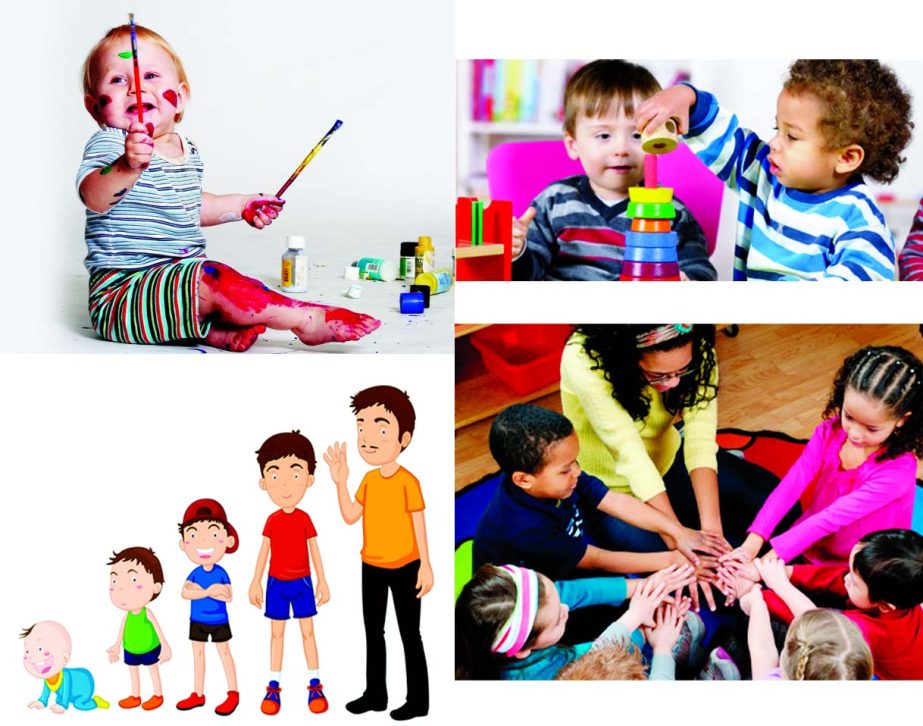
Dr Md Shairul Mashreque :
Early childhood development refers to the growth that takes place from pre-conception until age six. (Wikipedia, website www. Mcf.gov.bc.ca). It is defined as “the period from birth to 8 years old. A time of remarkable brain development, these years lay the foundation for subsequent learning.”
Researchers in the field and early childhood development view the parents as an integral part of the early childhood development process. “The early years are the most critical for neurological development, as the most significant brain growth occurs in the first six years of life. The experiences of early childhood have a profound impact on the overall health and well being of individuals throughout their lifetime” (ibid).
Much of the first two years of life are spent is usually spent on nursing the infants. What most families need at the early stage of child development is early care in terms of health hygiene and education. “Early care must ensure that in addition to employing carefully selected and trained caretakers, program policy must emphasise links with family, home culture, and home language, meaning caregivers must uniquely care for each child using developmentally appropriate practice, individually appropriate practice and culturally appropriate Practice.”
As soon as a new baby is born we celebrate his/her advent with altercative toys. In fact baby’s cradle is decorated with toys. Little bay moves hand and leg at a time looking at the toys.
Play therapy
Play therapy is the dynamic process between child and play therapist in which the child explores at his or her own pace and with his or her own agenda those issues, past and current, conscious and unconscious, that are affecting the child’s life in the present. The child’s inner resources are enabled by the therapeutic alliance to bring about growth and change. Play therapy is child-centred, in which play is the primary medium and speech is the secondary medium, according to British Association of Play Therapists.
The Association for toy Therapy (2001) defines play therapy as the:
“systematic use of a theoretical model to establish an interpersonal process wherein trained play therapists use the therapeutic powers of play to help clients prevent or resolve psychosocial difficulties and achieve optimal growth and development.”
All three definitions draw attention to the relationship between therapist and client. Most play therapists, particularly those who follow a child-centred (Landreth 2002) or non-directive (Wilson and Ryan 2005) model, will not use play in order to “get the child to talk.” The play they witness and in which they participate is regarded as communication in its own right.
Toy Therapy
Toy therapy is suitable for children at the early stage of socialization. Some play therapists would also be able to give consultations and advice about therapeutic play interventions with babies and very young children. ‘ It is a developmentally sensitive intervention i.e. the therapist will always take into account the chronological age of the patient/client and the actual functioning age or ages. It is common for children to regress in their play to younger stages. The therapist is alert to this and supports the child in revisiting early experiences through sensory play, symbolic play, and whatever other play opportunities the child chooses spontaneously in the session.
This article will refer to the patient/client as ‘the child.’ For convenience the child will be ‘he’ and the therapist ‘she.’ Play therapy is used to help both typically and atypically developing children, that is a child who have physical and/or learning disabilities.
However, play therapy should not be confused with physical therapies: It is psychotherapeutic in essence.
Children with a wide range of mental health and diagnoses and other difficulties may be offered play therapy, including those who:
have experienced physical, emotional and sexual abuse, physical and emotional neglect;
have experienced a single trauma;
have experienced multiple trauma;
have witnessed domestic abuse (domestic violence);
have parents with physical and/or mental illnesses;
have parents with physical and/or mental disabilities or learning difficulties;
have had one or more bereavements and/or other significant losses.
Some children will have diagnoses of mental health problems such as:
Reactive Attachment Disorder;
Oppositional Defiant Disorder;
Conduct Disorder;
Attention Deficit Disorder with/without Hyperactivity (ADHD/ADD);
Asperge’s Syndrome;
One of the eating disorders. n
(Dr Md Shairul Mashreque is Professor of Public Administration, Chittagong University)

